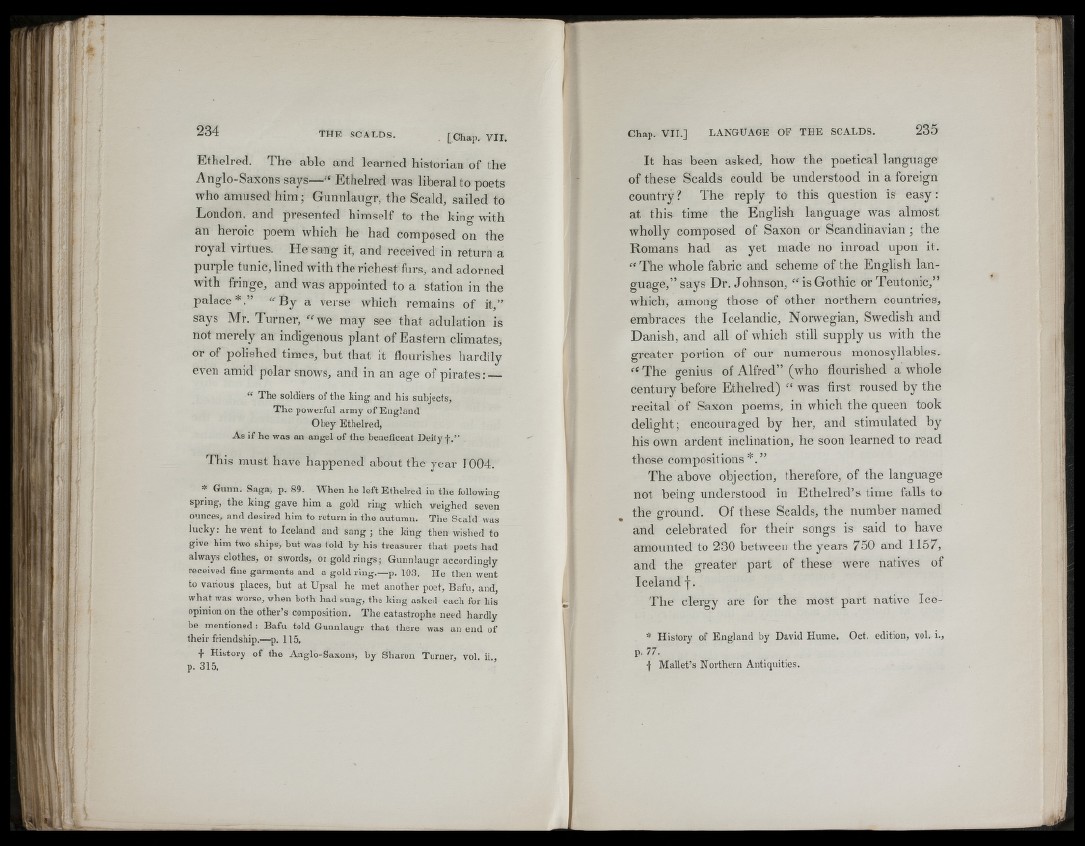
■ iii
Ethelred. The able and learned historian of the
Anglo-Saxons says—“ Ethelred was liberal to poets
who amused h im ; Gunnlaugr, the Scald, sailed to
London, and presented himself to the king with
an heroic poem which he had composed on the
royal virtues. He sang it, and received in return a
purple tunic, lined with the richest furs, and adorned
with fringe, and was appointed to a station in the
p alace*.” “ By a verse which remains of it,”
says Mr. Turner, “ we may see that adulation is
not merely an indigenous plant of Eastern climates,
or of polished times, but that it flourishes hardily
even amid polar snows, and in an age of pirates: —
" The soldiers of the kin g and his subjects.
The powerful army o f England
Obey Ethelred,
As if he was an angel o f the beneficent Deity f . ”
This must have happened about the year 1004.
* Gunn. Saga, p. 89. When he left Ethelred in the following
spring, the king gave him a gold ring which weighed seven
ounces, and desired him to return in the autumn. The Scald was
lu c k y ; he went to Iceland and sang ; the king then wished to
give him two ships, but was told by his treasurer th a t poets had
always clothes, or swords, or gold rings; Gunnlangr accordingly
received fine garments and a gold ring.— p. 103. H e then went
to various places, but at Upsal he met another poet, Bafu, and,
what was worse, when both had sung, the king asked each for his
opinion on the other’s composition. Th e catastrophe need hardly
be mentioned : Bafu told Gunnlangr that there was an end o f
their friendship.— p. 115,
f History o f the Anglo-Saxons, by Sharon Turner, vol. ii.,
p. 315.
I t has been asked, how the poetical language
of these Scalds could be understood in a foreign
country? The reply to this question is easy:
at this time the English language was almost
wholly composed of Saxon or Scandinavian ; the
Romans had as yet made no inroad upon it.
“ The whole fabric and scheme of the English language,”
says Dr. Johnson, “ is Gothic or Teutonic,”
which, among those of other northern countries,
embraces the Icelandic, Norwegian, Swedish and
Danish, and all of which still supply us with the
greater portion of our numerous monosyllables.
“ The genius of Alfred” (who flourished a whole
century before Ethelred) “ was first roused by the
recital of Saxon poems, in which the queen took
delight; encouraged by her, and stimulated by
his own ardent inclination, he soon learned to read
those compositions *. ”
The above objection, therefore, of the language
not being understood in Ethelred’s time falls to
the ground. Of these Scalds, the number named
and celebrated for their songs is said to have
amounted to 230 between the years 750 and 1157,
and the greater part of these were natives of
Iceland f .
The clergy are for the most part native Ice-
* History of England by David Hume. Oct. edition, vol. i.,
p. 77.
f Mallet’s Northern Antiquities.